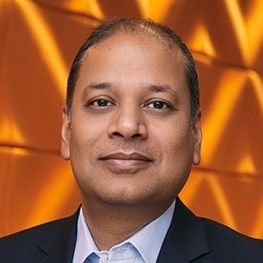The future of cancer care and the power of transformative innovation in Europe
By Samit Hirawat, M.D., Executive Vice President, Chief Medical Officer, Global Drug Development
Estimates show that approximately 1.2 million people in the European Union lost their lives to the disease1 in 2020. But over the last decade, we have seen unprecedented breakthroughs in cancer research, and more people are living longer with the disease than ever before.
As an oncologist with a passion for clinical research and drug development, it has been a great privilege to contribute over the last 20 years to the tremendous progress that we have seen in the cancer treatment landscape.
I am fortunate to lead incredibly talented teams at Bristol Myers Squibb, where we are driven to understand human biology and the complexities of the disease to advance cancer research. Such research is a long and complicated journey, but it has led to scientific breakthroughs that have made a tremendous impact on patients’ lives.
I am fortunate to lead incredibly talented teams at Bristol Myers Squibb, where we are driven to understand human biology and the complexities of the disease to advance cancer research. Such research is a long and complicated journey, but it has led to scientific breakthroughs that have made a tremendous impact on patients’ lives.
At Bristol Myers Squibb, we have a proud history of spearheading breakthroughs that have helped change the cancer treatment landscape, including pioneering immunotherapy, and more recently pursuing cell therapy research, that is helping transform the treatment of certain aggressive blood cancers, unlocking new potential in how hematological malignancies can be treated.
Applying our deep understanding of disease biology and the immune system, we are pursuing new approaches to help determine the most appropriate treatment for each specific patient, type of disease and line of therapy. Through our research and development efforts, we leverage clinical, real-world and translational data, along with an understanding of what is most important to patients. Such a data-rich approach is the way to fuel the next wave of patient-centric, personalized drug discovery, opening the doors to nearly limitless innovation.
Changing the course of disease through EU policies supporting earlier detection and innovation
Tackling cancer is a matter of stakeholder collaboration, resilience, and political commitment. I praise the European Commission’s recognition of cancer as key healthcare priority through its Europe’s Beating Cancer Plan, an ambitious strategy that sets out actions to support and coordinate Member States' efforts at every stage of the disease.
In this respect, early detection has a critical role to play, as according to recent estimates, the expectation is for cancer incidence to increase up to 3.6 million new cases in the region by 20402. Early detection and diagnosis have been shown to be critical in certain cancers, such as lung cancer, and have contributed to patients living longer. To improve patient outcomes, Member States should implement their recently approved EU Council Recommendation on cancer screening, by updating or setting up systematic cancer screening schemes for the cancers identified as priority according to the most up to date scientific evidence.
At Bristol Myers Squibb, our commitment is to meaningfully advance the understanding of cancer through scientific innovation that can improve the lives of cancer patients. This requires a solid and predictable framework for pharmaceutical innovation. The upcoming revision of the EU’s General Pharmaceutical Legislation provides a once in a generation opportunity to foster the growth of the pharmaceutical research ecosystem. The proposed revision should recognise the importance of maintaining Regulatory Data Protection (RDP) to incentivise and reward scientific advancement.
RDP protects – for a limited period of time – the safety, efficacy, and quality data resulting from many years of extensive research and clinical trials, which are needed to prove that a medicine is safe and effective.
If we all play our part, we can make significant steps in tackling cancer across Europe and worldwide. Where a cancer prognosis was once measured in months, now, long-term survival is a possibility for more patients. I am optimistic and excited about the future of cancer care an the potential for turning the innovations of today into the breakthroughs of tomorrow.
SOURCES:
1. World Health Organisation. Cancer fact sheet. Available here: https://www.who.int/news-room/fact-sheets/detail/cancer Last accessed: July 2022
2. Office For National Statistics. Total cancer deaths in the UK in 2019 and 2020. Available at: http://ons.gov.uk/aboutus/transparencyandgovernance/freedomofinformationfoi/total-cancer-deaths-in-the-uk-in-2019-and-2020 Last accessed: July 2022
As chief medical officer, Global Drug Development, Dr. Samit Hirawat oversees late-stage product development across all therapeutic areas. In this role, Samit and his organization focus on enabling the rapid progression and delivery of late-stage assets, from proof-of-concept to commercialization, through world-class clinical trial design and operations.
Samit joined Bristol Myers Squibb in 2019 with extensive drug development experience, most recently serving as Executive Vice President and Head of Oncology Development for Novartis. Previously, he led clinical development programs in multiple indications at PTC Therapeutics and Pfizer/Pharmacia Corporation.
Samit earned his bachelor of medicine, bachelor of surgery (MBBS) at Sawai Man Singh Medical College in India, and completed his internal medicine residency and medical oncology training at North Shore University Hospital, New York.

